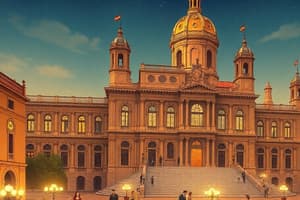Podcast
Questions and Answers
¿Cuál fue el porcentaje de analfabetismo en España en 1931?
¿Cuál fue el porcentaje de analfabetismo en España en 1931?
44%
¿Qué región de España fue declarada como autónoma durante este período?
¿Qué región de España fue declarada como autónoma durante este período?
Cataluña
¿Cuál fue el contenido principal de la Constitución de la República aprobada?
¿Cuál fue el contenido principal de la Constitución de la República aprobada?
Transformación de España
¿Qué tipo de violencia se menciona en el texto en relación con las tensiones religiosas?
¿Qué tipo de violencia se menciona en el texto en relación con las tensiones religiosas?
¿Qué evento llevó a la renuncia de Azaña?
¿Qué evento llevó a la renuncia de Azaña?
¿Qué reformas anunció el gobierno provisional para modernizar y democratizar España?
¿Qué reformas anunció el gobierno provisional para modernizar y democratizar España?
¿Qué porcentaje de la población en España en 1931 no sabía leer ni escribir?
¿Qué porcentaje de la población en España en 1931 no sabía leer ni escribir?
¿Qué llevó a actos de violencia contra edificios religiosos durante este periodo?
¿Qué llevó a actos de violencia contra edificios religiosos durante este periodo?
¿Cuál fue el resultado de la insurrección que los anarquistas llamaron a realizar?
¿Cuál fue el resultado de la insurrección que los anarquistas llamaron a realizar?
¿Qué región fue declarada autónoma dentro de España durante este periodo?
¿Qué región fue declarada autónoma dentro de España durante este periodo?
Flashcards are hidden until you start studying
Study Notes
- Gobierno provisional anuncia transformationes para modernizar y democratizar España.
- España en 1931: subdesarrollado, 44% of population unable to read or write, lack of schools and teachers.
- Gobierno focuses on education and military reform, with limited success.
- Anticlericalism leads to violence against religious buildings.
- Constitución de la República approve in June 1931, introducing democracia parlamentaria and autonomy.
- Republican-socialist parties win elections, socialists form government with focus on workers' rights.
- Division among workers' syndicates, anarchists call for insurrection.
- First military coup attempt by General Sanjurjo in August 1932, easily suppressed.
- Azaña pushes forward with catalán estatuto and agrarian reform.
- Catalonia declared autonomous region within Spain, but agrarian reform faces resistance.
- Anarchist uprising in Casas Viejas results in brutal repression, leading to political crisis and Azaña's resignation.
- New elections called for November 1933.
Key facts:
- Gobierno provisional proposes transformation of Spain
- Spain in 1931: subdesarrollado, 44% illiterate
- Education and military reform efforts
- Anticlerical violence
- Approval of the Constitución de la República
- Republican-socialist parties win elections
- Division among workers' syndicates
- First military coup attempt
- Catalonia declared autonomous region
- Agrarian reform and resistance
- Anarchist uprising and Azaña's resignation.
Context: The text describes the early days of the Spanish Republic, focusing on the government's efforts to modernize and democratize Spain, religious tensions, education, military reform, and labor issues. Key events include the approval of the Constitución de la República, the division among workers' syndicates, the first military coup attempt, and the anarchist uprising in Casas Viejas. Throughout, the text highlights the challenges faced by the new government and the political turmoil that ensued.
Studying That Suits You
Use AI to generate personalized quizzes and flashcards to suit your learning preferences.




